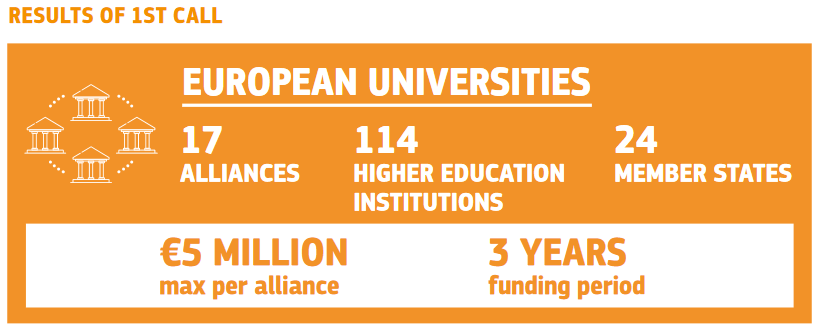Stay in the loop! Subscribe to our mailing list
The selection results of the 1st pilot call under the European Universities initiative were announced by the Commissioner for Education, Culture, Youth and Sport, Tibor Navracsics during a press conference on 26 June 2019. In total, 17 consortia – out of the 54 that applied under this call – have been selected for funding. They bring together 114 higher education institutions (research universities mostly) from 24 EU member states, as well as from Norway. The evaluation of applications was carried by 26 external experts (including rectors, professors and researchers).
While some alliances are more comprehensive in nature and cover multiple disciplines, others are focusing on specific aspects or areas, such as urban coastal sustainability, social sciences or global health. The selected alliances are composed on an average of seven higher education institutions from different parts of Europe, with ‘old’ alliances observed, as well as with new partnerships being formed.
The initial budget of EUR 30 million was increased to EUR 60 million in February 2019, and finally to EUR 85 million, to allow for funding these 17 alliances (compared to the 12 foreseen when the call was closed). Each selected consortium will receive up to EUR 5 million in the coming three years to start implementing their vision. Their progress will be closely monitored, and it seems likely that those performing well might be able to apply for additional funding under the Erasmus 2021 – 2027 programme.
On 12 June 2019, the European Commission also held another stakeholder consultation meeting in Brussels. The meeting gathered representatives of university networks and of national agencies, to discuss the experiences of those that submitted applications under the 1st pilot call, with a view to adjust the 2nd pilot call, which will be launched this autumn. A similar meeting took place on 17 June with the representatives of EU member states (the ‘ad-hoc’ expert group). Amongst the topics covered during the two meetings were: the size of the budget per alliance, submission requirements and further clarity and simplification of the application form, eligibility criteria and fine-tuning the weight given to different award criteria, and the role of the national agencies for Erasmus+ in the preparatory stage of applications.

Source: European Commission - European Universities Initiatives Factsheet